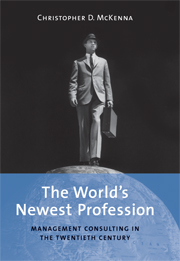Book contents
- Frontmatter
- Contents
- Series Editors' Preface
- Acknowledgments
- Introduction. Making a Career of Consulting
- 1 Economies of Knowledge: A Theory of Management Consulting
- 2 Accounting for a New Profession: Consultants' Struggle for Jurisdictional Power
- 3 How Have Consultants Mattered? The Case of Lukens Steel
- 4 Creating the Contractor State: Consultants in the American Federal Government
- 5 Finding Profit in Nonprofits: The Influence of Consultants on the Third Sector
- 6 The Gilded Age of Consulting: A Snapshot of Consultants Circa 1960
- 7 The American Challenge: Exporting the American Model
- 8 Selling Corporate Culture: Codifying and Commodifying Professionalism
- 9 Watchdogs, Lapdogs, or Retrievers? Liability and the Rebirth of the Management Audit
- Conclusion.The World's Newest Profession?
- Notes
- Index
1 - Economies of Knowledge: A Theory of Management Consulting
Published online by Cambridge University Press: 18 August 2009
- Frontmatter
- Contents
- Series Editors' Preface
- Acknowledgments
- Introduction. Making a Career of Consulting
- 1 Economies of Knowledge: A Theory of Management Consulting
- 2 Accounting for a New Profession: Consultants' Struggle for Jurisdictional Power
- 3 How Have Consultants Mattered? The Case of Lukens Steel
- 4 Creating the Contractor State: Consultants in the American Federal Government
- 5 Finding Profit in Nonprofits: The Influence of Consultants on the Third Sector
- 6 The Gilded Age of Consulting: A Snapshot of Consultants Circa 1960
- 7 The American Challenge: Exporting the American Model
- 8 Selling Corporate Culture: Codifying and Commodifying Professionalism
- 9 Watchdogs, Lapdogs, or Retrievers? Liability and the Rebirth of the Management Audit
- Conclusion.The World's Newest Profession?
- Notes
- Index
Summary
In 1930, Business Week introduced its readers to a new professional service: management consulting. As the writers at Business Week explained, the existing system of business professionals had become so complicated that, according to James McKinsey at the University of Chicago, a new type of professional was “increasing in numbers and influence … the advisor that tells business what other advisors to use and when.” Although Business Week would go on to chronicle the rise of management consulting over the next seventy years, consultants struggled to explain to the public what service they performed, particularly as the world's newest profession kept expanding faster than the wider American economy.
Since the 1930s, observers have repeatedly been surprised by the growth of management consulting. In 1965, Business Week commented with astonishment that there was one consultant for every hundred salaried managers. By 1995, the ratio stood at one for every thirteen. “Will the growth of consulting finally stop,” people were prone to ask, “when every manager employs their own personal consultant?” The sheer number of consultants nowadays may be striking, but their relative increase is particularly interesting when one wonders, following Peter Drucker's lead: “Why management consultants” at all? In other words, why should executives routinely employ outsiders to advise them on administrative issues about which they, presumably, are themselves the experts? Or, following the language of economists, why do executives employ external advisors to span the boundaries of the firm?
- Type
- Chapter
- Information
- The World's Newest ProfessionManagement Consulting in the Twentieth Century, pp. 8 - 25Publisher: Cambridge University PressPrint publication year: 2006

